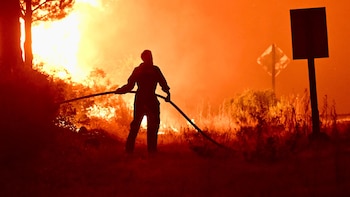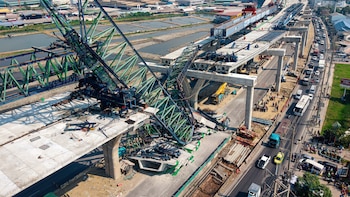There will be a refugee olympic team at the Olympic Games Tokyo 2020. The decision was taken today by the membership of the International Olympic Committee (IOC) at the 133rd IOC Session in Buenos Aires.
The initiative is a continuation of the IOC's commitment to play its part in addressing the global refugee crisis and another opportunity to continue to convey the message of solidarity and hope to millions of refugee and internally displaced athletes around the world.
The IOC Session has mandated Olympic Solidarity to establish the conditions for participation and define the identification and selection process of the team. These elements will be carried out in close collaboration with the National Olympic Committees, the International Sport Federations, the Organising Committee Tokyo 2020 and the UN Refugee Agency, UNHCR.
The announcement of the Refugee Olympic Team Tokyo 2020 members will be made in 2020.
IOC President Thomas Bach said:
"The IOC Session has once again endorsed this initiative. In an ideal world, we would not need to have a Refugee Team at the Olympic Games. But, unfortunately, the reasons why we first created a Refugee Olympic Team before the Olympic Games Rio 2016 continue to persist. We will do our utmost to welcome refugee athletes and give them a home and a flag in the Olympic Village in Tokyo with all the Olympic athletes from 206 National Olympic Committees. This is the continuation of an exciting, human and Olympic journey, and a reminder to refugees that they are not forgotten."
UNHCR High Commissioner Filippo Grandi commended the decision:
"In 2016, the Rio refugee team captured the imagination of people around the world and showed the human side of the global refugee crisis through sport. I’m delighted that this tradition is to continue in Tokyo. Giving these exceptional young people the opportunity to compete at the very highest levels is admirable."
Back in 2015, the first-ever Refugee Olympic Team was formed by the IOC. Ten athletes were chosen to represent people who are too often forgotten. It was a historic moment in Brazil when a team consisting of refugees participated for the first time ever in the Olympic Games at Rio 2016. As they marched in the Opening Ceremony, two swimmers, two judokas, a marathon runner and five middle-distance runners who originally hailed from Ethiopia, South Sudan, Syria and the Democratic Republic of the Congo became instant role models for the 68.5 million or so refugees and internally displaced people, and true global ambassadors for the values of Olympism.
Since the Olympic Games, the IOC has continued to support these 10 Refugee Olympians, as well as a number of other refugee athletes across five continents via Olympic Solidarity’s Refugee Athlete Support Programme. Through scholarships, which come in the form of monthly training grants and fixed competition subsidies, Olympic Solidarity and their host National Olympic Committees help these refugee athletes to prepare for and participate in national and international competitions. UNHCR, through its long term collaboration with the IOC, plays a crucial role in all stages of selection, approval and follow up of the athletes.
Furthermore, in September 2017, the IOC launched the Olympic Refuge Foundation to support more broadly the protection and empowerment of vulnerable displaced people through sport and through the creation of safe spaces; again, partnering with UNHCR and local implementation partners in the field.
For the last 20 years, and with the collaboration of UNHCR, the IOC has been providing relief to refugees and internally displaced people by using the power of sport to promote youth development, education, social integration and health. These actions have brought the joy of sport and the related psychological healing to refugee populations in many camps and settlements around the world.
25 Years at #1: Your best source of news about the Olympics is www.aroundtherings.com, for subscribers only
Últimas Noticias
Sinner-Alcaraz, the duel that came to succeed the three phenomenons
Beyond the final result, Roland Garros left the feeling that the Italian and the Spaniard will shape the great duel that came to help us through the duel for the end of the Federer-Nadal-Djokovic era.
Table tennis: Brazil’s Bruna Costa Alexandre will be Olympic and Paralympic in Paris 2024
She is the third in her sport and the seventh athlete to achieve it in the same edition; in Santiago 2023 she was the first athlete with disabilities to compete at the Pan American level and won a medal.

Rugby 7s: the best player of 2023 would only play the medal match in Paris
Argentinian Rodrigo Isgró received a five-game suspension for an indiscipline in the circuit’s decisive clash that would exclude him until the final or the bronze match; the Federation will seek to make the appeal successful.

Rhonex Kipruto, owner of the world record for the 10000 meters on the road, was suspended for six years
The Kenyan received the maximum sanction for irregularities in his biological passport and the Court considered that he was part of a system of “deliberate and sophisticated doping” to improve his performance. He will lose his record and the bronze medal at the Doha World Cup.

Katie Ledecky spoke about doping Chinese swimmers: “It’s difficult to go to Paris knowing that we’re going to compete with some of these athletes”
The American, a seven-time Olympic champion, referred to the case of the 23 positive controls before the Tokyo Games that were announced a few weeks ago and shook the swimming world. “I think our faith in some of the systems is at an all-time low,” he said.



